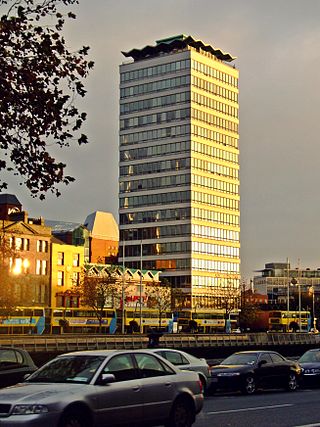Related Research Articles

The economy of Finland is a highly industrialised, mixed economy with a per capita output similar to that of western European economies such as France, Germany, and the United Kingdom. The largest sector of Finland's economy is its service sector, which contributes 72.7% to the country's gross domestic product (GDP); followed by manufacturing and refining at 31.4%; and concluded with the country's primary sector at 2.9%.

SIPTU is Ireland's largest trade union, with around 200,000 members. Most of these members are in the Republic of Ireland, although the union does have a Northern Ireland District Committee. Its head office, Liberty Hall, is in Dublin, and the union has five industrial divisions, three in the private sector and two in the public sector. SIPTU is affiliated to the Irish Congress of Trade Unions

The Bharatiya Mazdoor Sangh is a trade union in India. It was founded by Dattopant Thengadi on 23 July 1955.

Labor unions represent United States workers in many industries recognized under US labor law since the 1935 enactment of the National Labor Relations Act. Their activity today centers on collective bargaining over wages, benefits, and working conditions for their membership, and on representing their members in disputes with management over violations of contract provisions. Larger trade unions also typically engage in lobbying activities and electioneering at the state and federal level.

The Nordic model comprises the economic and social policies as well as typical cultural practices common in the Nordic countries. This includes a comprehensive welfare state and multi-level collective bargaining based on the economic foundations of social corporatism, and a commitment to private ownership within a market-based mixed economy — with Norway being a partial exception due to a large number of state-owned enterprises and state ownership in publicly listed firms.
A collective agreement, collective labour agreement (CLA) or collective bargaining agreement (CBA) is a written contract negotiated through collective bargaining for employees by one or more trade unions with the management of a company that regulates the terms and conditions of employees at work. This includes regulating the wages, benefits, and duties of the employees and the duties and responsibilities of the employer or employers and often includes rules for a dispute resolution process.
The European Trade Union Confederation was set up in 1973 to promote the interests of working people at the European level and to represent them in the European Union institutions. It is recognized by the European Union, the Council of Europe, and the European Free Trade Association as the only representative cross-sectoral trade union organization at the European level.
Labour in India refers to employment in the economy of India. In 2020, there were around 476.67 million workers in India, the second largest after China. Out of which, agriculture industry consist of 41.19%, industry sector consist of 26.18% and service sector consist 32.33% of total labour force. Of these over 94 percent work in unincorporated, unorganised enterprises ranging from pushcart vendors to home-based diamond and gem polishing operations. The organised sector includes workers employed by the government, state-owned enterprises and private sector enterprises. In 2008, the organised sector employed 27.5 million workers, of which 17.3 million worked for government or government owned entities. The Human Rights Measurement Initiative finds that India is only doing 43.9% of what should be possible at its level of income for the right to work. Employees are routinely taken advantage of by their employers because of loose labour laws across all industries in India.

The economy of Sweden is a highly developed export-oriented economy, aided by timber, hydropower, and iron ore. These constitute the resource base of an economy oriented toward foreign trade. The main industries include motor vehicles, telecommunications, pharmaceuticals, industrial machines, precision equipment, chemical goods, home goods and appliances, forestry, iron, and steel. Traditionally, Sweden relied on a modern agricultural economy that employed over half the domestic workforce. Today Sweden further develops engineering, mine, steel, and pulp industries, which are competitive internationally, as evidenced by companies like Ericsson, ASEA/ABB, SKF, Alfa Laval, AGA, and Dyno Nobel.

The Finnish Transport Workers' Union is a trade union representing transport workers in Finland.
The Trade Union for the Public and Welfare Sectors is a trade union representing workers in the public sector and welfare services, in Finland.
The Joint Organisation of State Employees was a trade union federation bringing together public sector workers in Finland.
The Service Union United is a trade union representing service sector workers in Finland.
The Construction Trade Union is a trade union representing workers in the construction industry in Finland.

The Post and Logistics Union is a trade union, principally representing postal workers, in Finland.
The Postal Union was a trade union representing postal workers in Finland.
The Postal Officers' Union was a trade union representing postal service workers in Finland.
The Union of Insurance Employees is a trade union representing workers in the insurance industry in Finland.
The Federation of Public and Private Sector Employees is a trade union representing local government workers in Finland.
The Union of Private Sector Professionals is a trade union representing a variety of private sector professionals.
References
- ↑ "Historia". Freelance ohjelmatyöntekijät ry. Retrieved 13 March 2020.
- ↑ Ebbinghaus, Bernhard; Visser, Jelle (2000). Trade Unions in Western Europe Since 1945. Basingstoke: Palgrave Macmillan. p. 219. ISBN 0333771125.
- ↑ Rossi, Leena. "Lähes 70 vuotta yhden naisvaltaisen ammattialan järjestäytymistä". Agricola. Retrieved 3 March 2020.